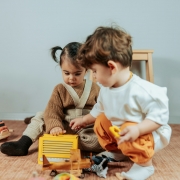What Makes a Good Play-Based Program
Understanding what makes an excellent play-based program is crucial for anyone involved in early childhood education. A quality program focuses on fun and lays a solid foundation for a child’s overall development. At Eskay Kids, learning through play is the most effective way to engage young minds.
Educators can turn everyday activities into powerful learning experiences through careful planning and thoughtful interaction. This approach helps children develop essential life skills and instils a lifelong love for learning.
Key Components of a Quality Play-Based Program
Child-Centered Learning Environment
A child-centred learning environment is fundamental to any good play-based program. In such settings, children can explore and make choices about their play. The classroom is set up with various stations or areas that cater to different interests and developmental stages. For example, there might be a reading corner, a block area, and an art station. This setup allows kids to move freely from one activity to another, fostering independence and decision-making skills.
The materials and toys provided are open-ended, meaning they can be used in multiple ways. This encourages creativity and problem-solving. For instance, blocks can become anything from a house to a castle, depending on the child’s imagination. An environment that supports children’s natural curiosity helps create a sense of ownership over their learning journey. This learning environment ensures that each child’s unique needs and interests are met.
Qualified and Engaged Educators
In a quality play-based program, educators play a crucial role. They are not mere supervisors but active participants in the learning process. Qualified educators understand the importance of play in child development and know how to create fun and educational activities. They observe the children to see what interests them and then plan activities that expand on those interests.
Engaged educators also know when to step back and let the children lead. They offer guidance and support only when needed, allowing kids to explore and learn independently. These educators continuously update their skills and knowledge through ongoing professional development. By staying informed about the latest research and techniques, they ensure the highest quality of education and care for the children.
Importance of Intentional Planning
Balancing Guided and Free Play
A great play-based program strikes a balance between guided and free play. Free play allows children to follow their interests and use their imaginations without specific goals or instructions. It helps them develop independence and decision-making skills. Guided play, on the other hand, is more structured and involves a bit of adult direction. This type of play ensures that specific educational goals are met while keeping the experience enjoyable for the children.
The key is to blend these two approaches seamlessly. For example, an educator might set up a science experiment but let the children decide how to execute it. This way, the kids are guided in their learning but still have the freedom to explore and make discoveries independently. Such a balance makes learning both purposeful and fun.
Tailoring Activities to Children’s Interests
One of the most effective ways to keep children engaged in a play-based program is to tailor activities to their interests. When kids are excited about what they’re doing, they are more likely to participate actively and retain the information they learn. Educators should take the time to observe the children and note what activities capture their attention.
Once these interests are identified, educators can plan activities that align with them. For example, if a child shows interest in animals, an educator might organise a role-play activity where children pretend to be zookeepers. Tailoring activities this way makes the children’s learning experience more relevant and enjoyable.
Focusing on what excites and motivates the children can help educators create a more dynamic and effective learning environment. This approach makes learning fun and supports deeper understanding and retention of new information.
Essential Types of Play in the Curriculum
Dramatic Play for Social Skills
Dramatic play is essential for teaching social skills. When children engage in activities like playing house, dressing up, or pretending to be different characters, they practice real-life social scenarios. They learn to cooperate, share, and resolve conflicts. These activities help them understand different roles and relationships, fostering empathy and communication skills.
For instance, during a role-playing game where children pretend to own a shop, they interact as customers, cashiers, and managers. They practice using polite language, negotiating, and working together to keep the shop running smoothly. Such experiences are invaluable for developing social awareness and skills that will benefit them throughout their lives.
Sensory Play for Cognitive Development
Sensory play is another critical component of a play-based curriculum. Activities that engage the senses, like playing with sand, water, or textured materials, help children explore and understand the world around them. Sensory play stimulates brain development by creating neural connections that support learning and cognitive growth.
For example, when children play with play dough, they explore its texture, shape it into different forms, and use it to create objects. This hands-on activity enhances their fine motor skills and encourages creativity. Sensory bins filled with various materials like rice, beans, or buttons also offer opportunities for sorting, counting, and classifying, which are foundational math skills.
Physical Play for Motor Skills
Physical play is vital for developing motor skills. Activities that involve running, jumping, climbing, and other bodily movements help children build strength, coordination, and balance, which are crucial for their overall physical development and health.
Games like tag, hide-and-seek, or obstacle courses encourage children to move their bodies differently. They learn to control their movements, understand spatial awareness, and improve their physical fitness. Physical play also promotes teamwork and cooperation, as children often have to work together to achieve a common goal.
Evaluating the Effectiveness of a Play-Based Program
Observing Children’s Growth and Development
To evaluate the effectiveness of a play-based program, it’s essential to observe children’s growth and development. Regular observations help educators understand how children progress in various areas, such as social skills, cognitive abilities, and motor development. By keeping track of these milestones, educators can identify areas where a child might need extra support.
Observations can be informal, like watching children during play, or more structured, like using checklists or developmental scales. These observations enable educators to personalise their teaching strategies, ensuring each child gets the support they need to thrive.
Feedback and Communication With Parents
Feedback and communication with parents are also crucial for evaluating a play-based program. Keeping parents informed about their child’s progress helps create a cohesive support system. Regular updates through meetings, reports, or digital communication tools ensure parents know about their child’s development and any areas needing attention.
Open communication allows parents to share their observations and insights, providing a fuller picture of the child’s growth. This approach ensures educators and parents collaborate to support the child’s learning journey.
Conclusion
A play-based program offers countless benefits for young children, making learning a joyful and engaging experience. We can create a rich learning atmosphere by focusing on critical components like a child-centred environment and qualified educators and by planning activities that balance guided and free play.
At Eskay Kids, we are committed to providing a high-quality childcare and early education centre in Springfield. Visit our website to learn more about our program and how we can support your child’s development. Let’s make learning a fun and enriching experience together!




